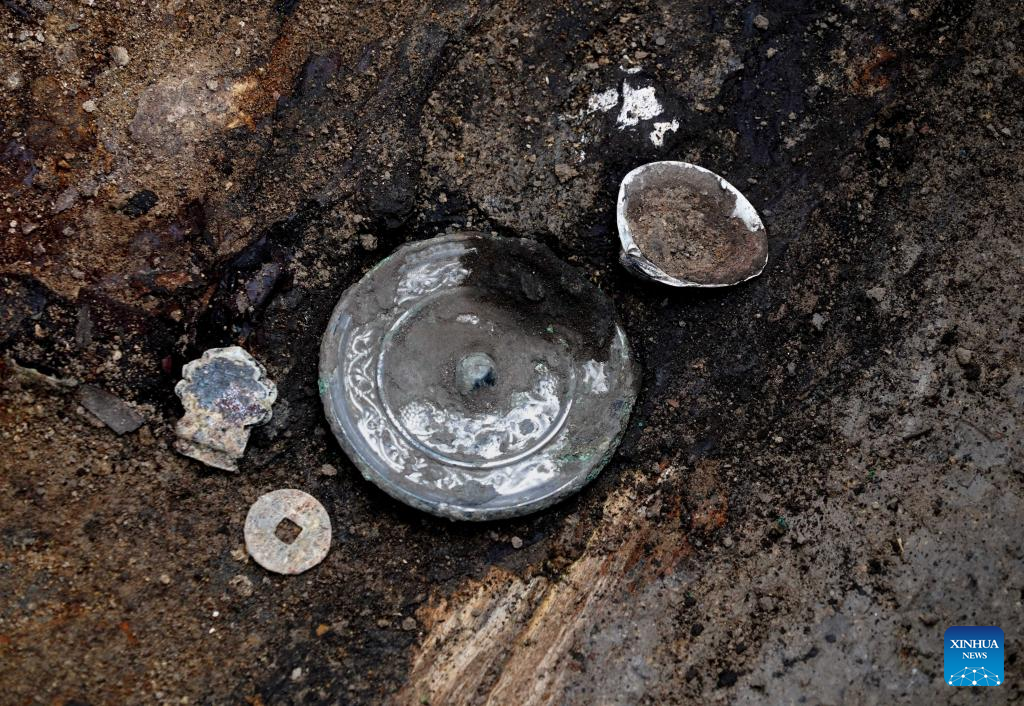
This photo taken on March 25, 2023 shows bronze coins and a bronze mirror unearthed from a Tang Dynasty (618-907) tomb at the Songguogucheng site, or the ancient capital ruins of the State of Song in the Spring and Autumn Period (770-476 BC), in Shangqiu, central China's Henan Province. Archaeologists in central China's Henan Province have discovered six tombs dating back to the Tang Dynasty (618-907) between two buried ancient city walls at different depths, shedding light on ancient site studies with multiple cultural layers in the Yellow River basin. (Xinhua/Li An)
ZHENGZHOU, March 28 (Xinhua) -- Archaeologists in central China's Henan Province have discovered six tombs dating back to the Tang Dynasty (618-907) between two buried ancient city walls at different depths, shedding light on ancient site studies with multiple cultural layers in the Yellow River basin.
According to Yue Hongbin, a researcher with the Chinese Academy of Social Sciences and the director of the Shangqiu institute of cultural relics and archaeology, the six tombs were located at the Songguogucheng site, or the ancient capital ruins of the State of Song in the Spring and Autumn Period (770-476 BC).
The tombs were at the intersection of the south wall of the ancient capital of Song State and the west wall of the ancient city of Suiyang of the Tang Dynasty, where the latter superimposes on the former, Yue said.
From the tombs, archaeologists unearthed copper coins, a copper mirror, clay jars, and the two most significant findings of precisely-dated tomb epitaphs, which provide evidence to determine the chronological sequence of the disuse and construction of city walls of different periods.
Situated at the site, a cluster of ancient city sites dating from the Spring and Autumn Period to the Ming Dynasty (1368-1644) had been found. The cultural layers of different periods at the site were caused by sediment accumulation and foundation elevation resulting from the watercourse change of the Yellow River in ancient times, said the institute. ■
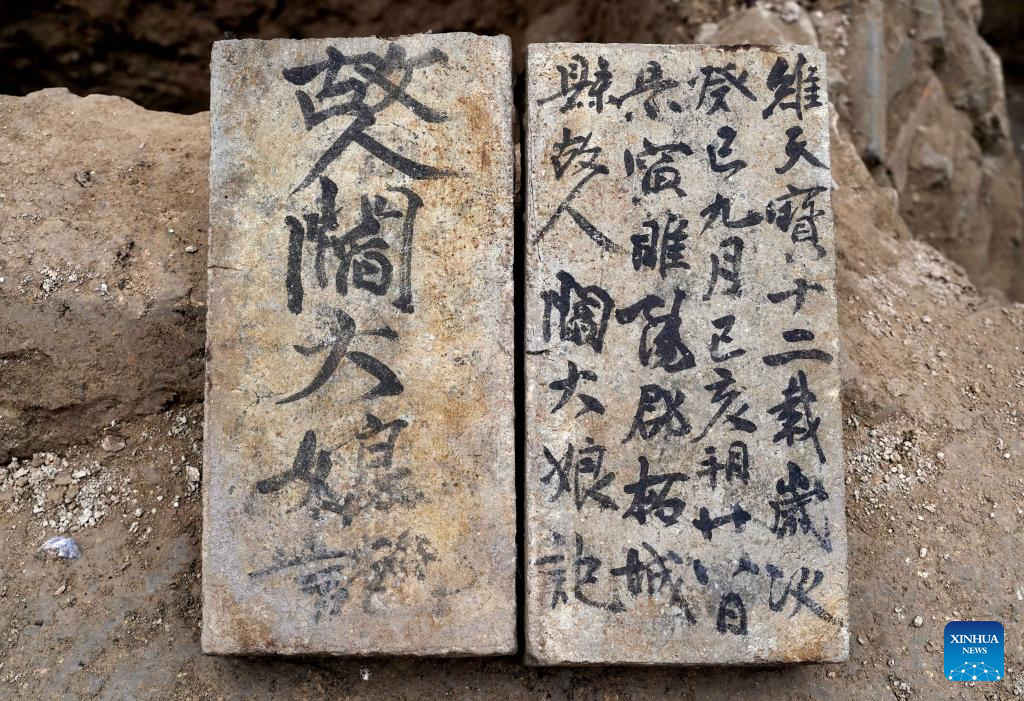
This photo taken on March 25, 2023 shows epitaphs unearthed from a Tang Dynasty (618-907) tomb at the Songguogucheng site, or the ancient capital ruins of the State of Song in the Spring and Autumn Period (770-476 BC), in Shangqiu, central China's Henan Province. Archaeologists in central China's Henan Province have discovered six tombs dating back to the Tang Dynasty between two buried ancient city walls at different depths, shedding light on ancient site studies with multiple cultural layers in the Yellow River basin. (Xinhua/Li An)
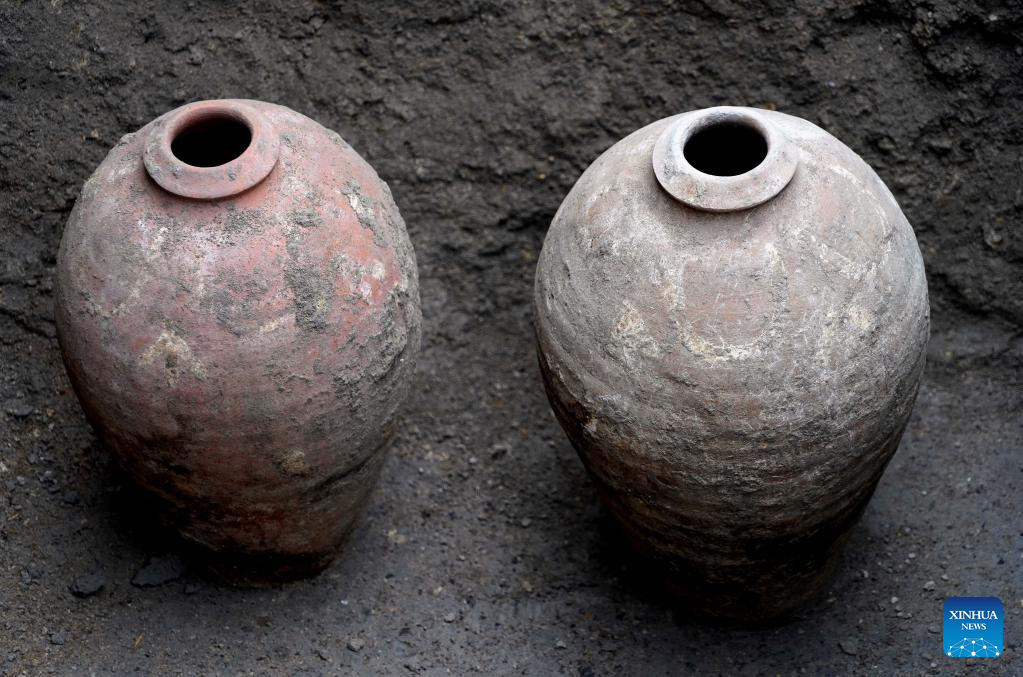
This photo taken on March 25, 2023 shows clay jars unearthed from a Tang Dynasty (618-907) tomb at the Songguogucheng site, or the ancient capital ruins of the State of Song in the Spring and Autumn Period (770-476 BC), in Shangqiu, central China's Henan Province.. Archaeologists in central China's Henan Province have discovered six tombs dating back to the Tang Dynasty (618-907) between two buried ancient city walls at different depths, shedding light on ancient site studies with multiple cultural layers in the Yellow River basin. (Xinhua/Li An)
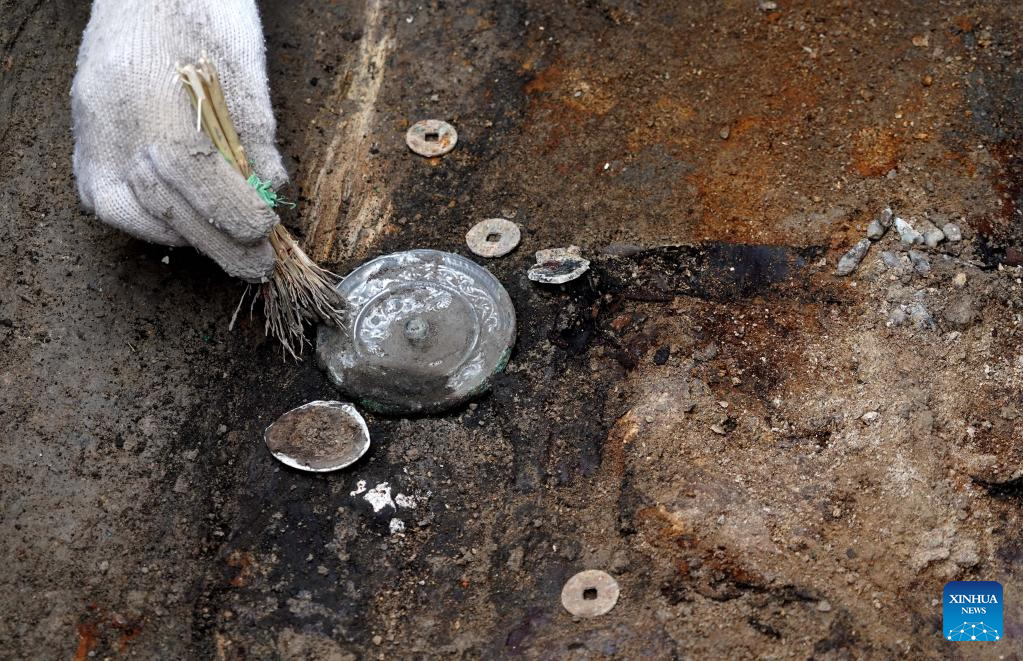
An archaeologist works at a Tang Dynasty (618-907) tomb discovered at the Songguogucheng site, or the ancient capital ruins of the State of Song in the Spring and Autumn Period (770-476 BC), in Shangqiu, central China's Henan Province, March 25, 2023. Archaeologists in central China's Henan Province have discovered six tombs dating back to the Tang Dynasty (618-907) between two buried ancient city walls at different depths, shedding light on ancient site studies with multiple cultural layers in the Yellow River basin. (Xinhua/Li An)
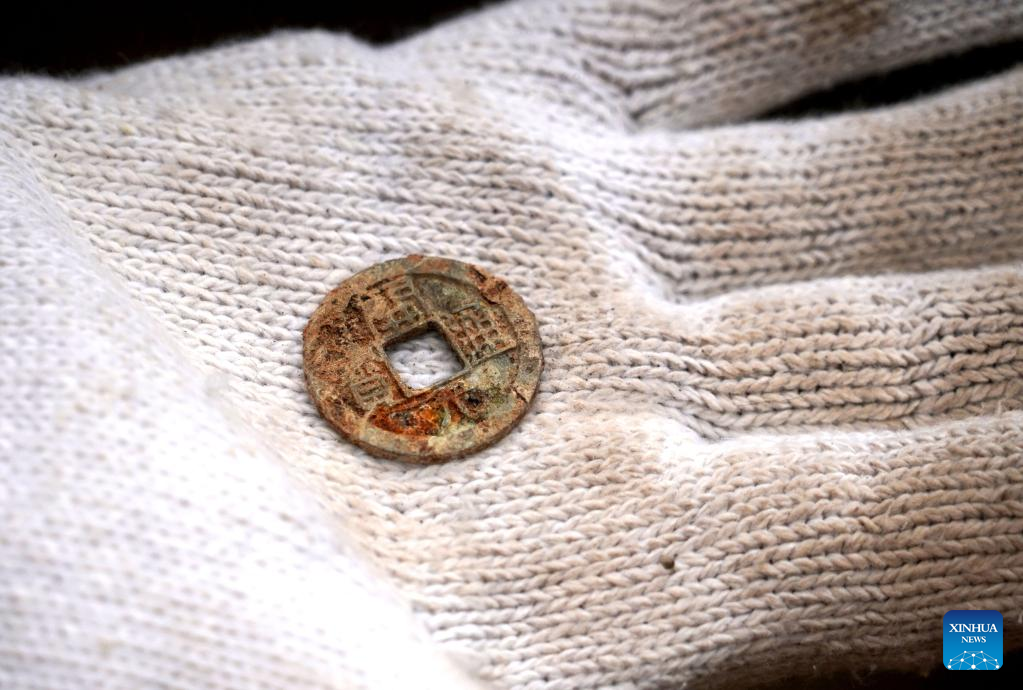
This photo taken on March 25, 2023 shows a bronze coin unearthed from a Tang Dynasty (618-907) tomb at the Songguogucheng site, or the ancient capital ruins of the State of Song in the Spring and Autumn Period (770-476 BC), in Shangqiu, central China's Henan Province. Archaeologists in central China's Henan Province have discovered six tombs dating back to the Tang Dynasty (618-907) between two buried ancient city walls at different depths, shedding light on ancient site studies with multiple cultural layers in the Yellow River basin. (Xinhua/Li An)
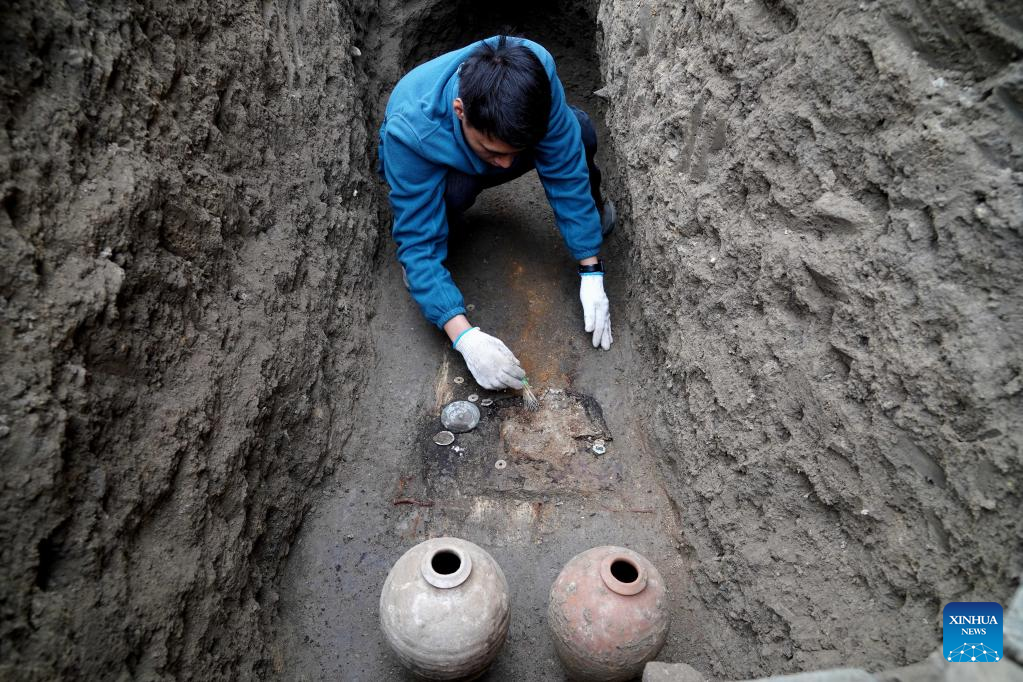
An archaeologist works at a Tang Dynasty (618-907) tomb discovered at the Songguogucheng site, or the ancient capital ruins of the State of Song in the Spring and Autumn Period (770-476 BC), in Shangqiu, central China's Henan Province, March 25, 2023. Archaeologists in central China's Henan Province have discovered six tombs dating back to the Tang Dynasty (618-907) between two buried ancient city walls at different depths, shedding light on ancient site studies with multiple cultural layers in the Yellow River basin. (Xinhua/Li An)
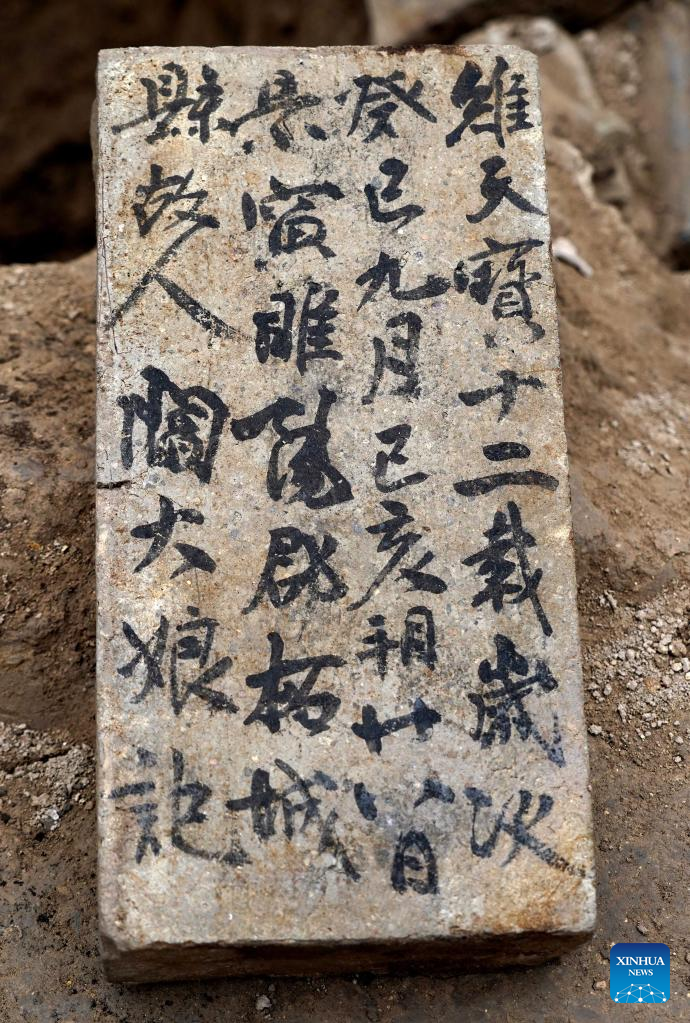
This photo taken on March 25, 2023 shows an epitaph unearthed from a Tang Dynasty (618-907) tomb at the Songguogucheng site, or the ancient capital ruins of the State of Song in the Spring and Autumn Period (770-476 BC), in Shangqiu, central China's Henan Province. Archaeologists in central China's Henan Province have discovered six tombs dating back to the Tang Dynasty (618-907) between two buried ancient city walls at different depths, shedding light on ancient site studies with multiple cultural layers in the Yellow River basin. (Xinhua/Li An)
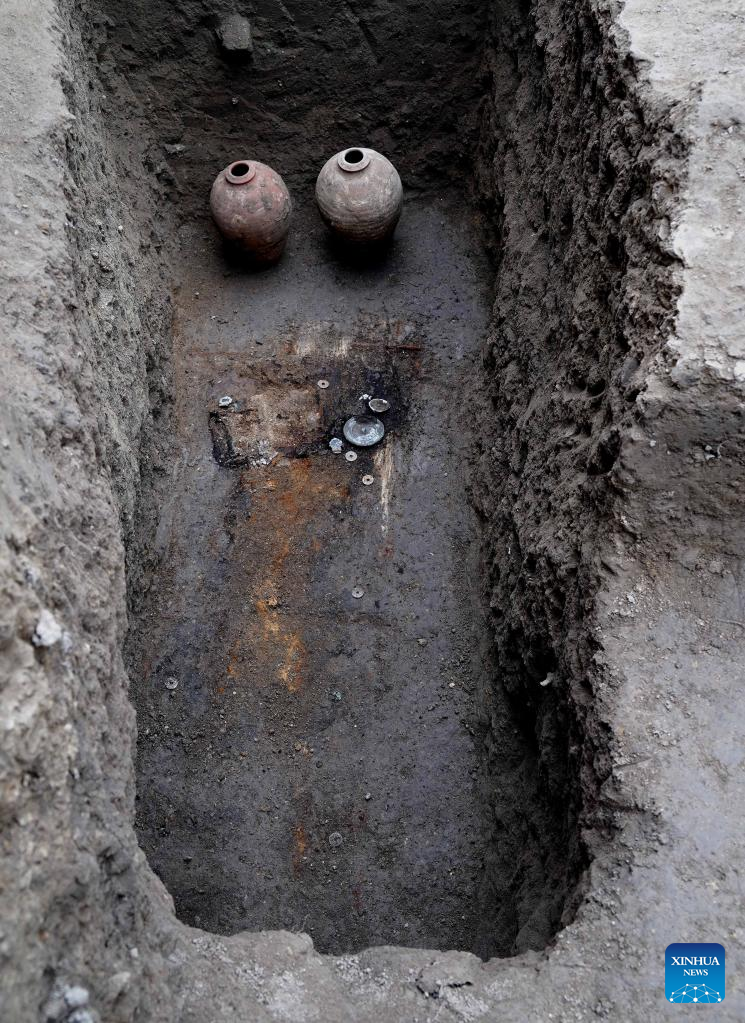
This photo taken on March 25, 2023 shows a Tang Dynasty (618-907) tomb discovered at the Songguogucheng site, or the ancient capital ruins of the State of Song in the Spring and Autumn Period (770-476 BC), in Shangqiu, central China's Henan Province. Archaeologists in central China's Henan Province have discovered six tombs dating back to the Tang Dynasty (618-907) between two buried ancient city walls at different depths, shedding light on ancient site studies with multiple cultural layers in the Yellow River basin. (Xinhua/Li An)
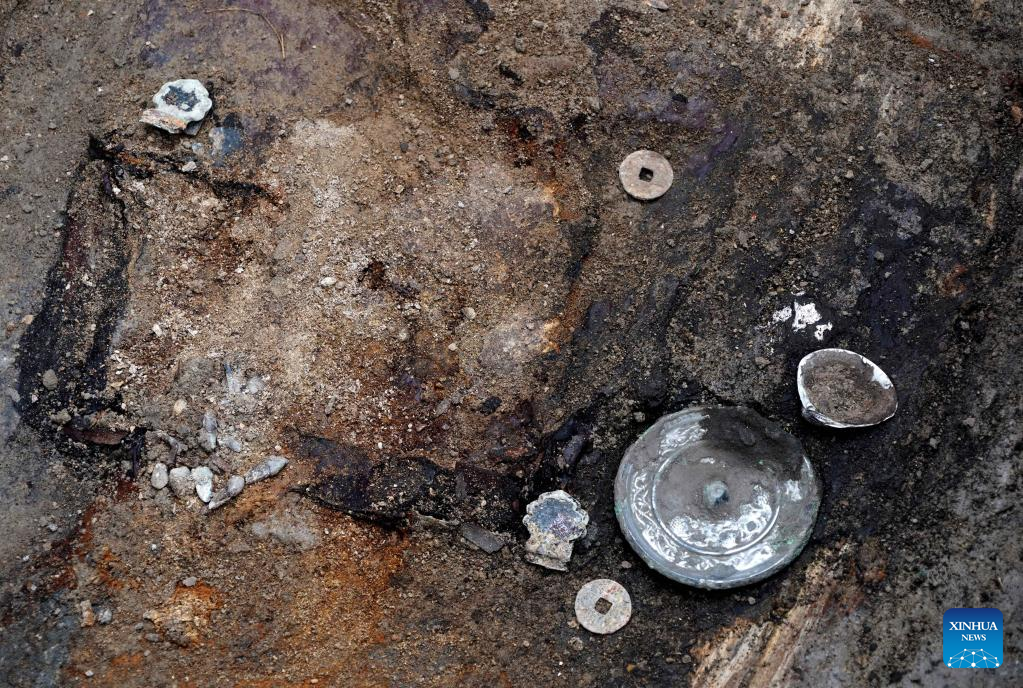
This photo taken on March 25, 2023 shows bronze coins and a bronze mirror unearthed from a Tang Dynasty (618-907) tomb at the Songguogucheng site, or the ancient capital ruins of the State of Song in the Spring and Autumn Period (770-476 BC), in Shangqiu, central China's Henan Province. Archaeologists in central China's Henan Province have discovered six tombs dating back to the Tang Dynasty (618-907) between two buried ancient city walls at different depths, shedding light on ancient site studies with multiple cultural layers in the Yellow River basin. (Xinhua/Li An)



